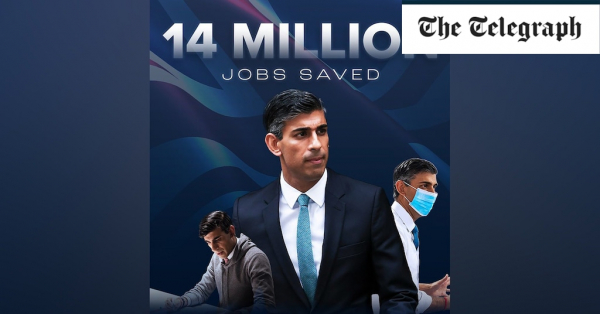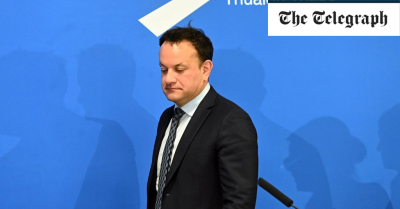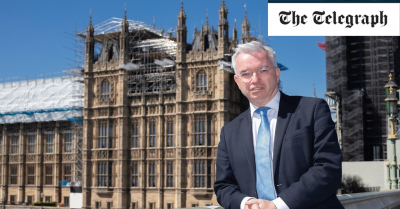Unveiling the Real Costs: The Truth Behind Furlough's Failure to Preserve Jobs

Unveiling the Furlough Fallout: The True Costs Behind Rishi Sunak's Heroic Narrative
Amidst the fanfare of a Hollywood-style advertisement, Rishi Sunak emerges as the supposed hero, credited with "saving" 14 million jobs through the furlough scheme. Yet, as the glossy image fades, the harsh reality begins to surface. The furlough program, initially hailed as a beacon of hope during the darkest days of the pandemic, is now revealing its true complexities and repercussions.
In the theatrical portrayal, SuperSunak is depicted in various heroic guises: at his desk in a trademark hoodie, striding with purpose, and even donning a face mask, poised to save lives. However, behind the scenes, Sunak grappled with doubt and uncertainty, haunted by the gamble of implementing such a sweeping measure. The furlough scheme, designed as a short-term solution, evolved into a prolonged lifeline, injecting £70 billion into the economy and supporting 11.7 million individuals over an extended period.
Yet, as the dust settles, the full extent of the scheme's impact becomes apparent. Britain's workforce remains diminished, casting doubt on the efficacy of the furlough scheme in preserving long-term employment. The Conservatives' claims of "saving" 14 million jobs ring hollow in light of the scheme's unintended consequences.
The reality is stark: while furlough may have temporarily staved off widespread job losses, it also hindered the natural economic rejuvenation process. Many argue that the generosity of the scheme may have perpetuated welfare dependency and propped up unsustainable jobs. In contrast, countries without such safety nets have witnessed swifter recoveries and resurgence in employment.
Moreover, the indiscriminate distribution of funds underscores the inefficiencies and unintended beneficiaries of the scheme. Even thriving entities received financial support, while others struggled to stay afloat. The experience of The Spectator, thriving amidst the pandemic-induced boom in entertainment consumption, highlights the paradoxical nature of the furlough scheme.
As we navigate the aftermath of the pandemic, it's imperative to critically assess the true costs and benefits of government interventions like furlough. While they may offer short-term relief, their long-term ramifications warrant careful consideration. The narrative of Rishi Sunak as a heroic savior must be scrutinized in light of the complexities and uncertainties surrounding the furlough scheme's legacy.
In a startling revelation of governmental inefficiency, we found ourselves in the perplexing situation of having to return taxpayer subsidy on top of a windfall. Faced with the moral dilemma of benefiting from both, we opted to return the surplus to the Treasury, only to encounter bureaucratic inertia. HMRC's incredulous response exemplified a system ill-prepared for such gestures, relenting only when faced with the prospect of leaving the funds in a swag bag outside the Treasury.
This episode underscored a disconcerting trend: the reflexive splurging of public funds when ministers succumb to panic. The energy price crisis epitomized this, with Liz Truss's blanket subsidization inadvertently extending taxpayer assistance to billionaires heating their swimming pools. What began as a necessity during economic crises has morphed into an expectation of perpetual bailouts among companies and the wealthy, resulting in an expanded state and a heavier tax burden for all.
The consequences of this profligacy extend beyond mere financial implications. The Bank for International Settlements observed a sluggish employment recovery in countries where pandemic-related fiscal support was most substantial. Moreover, there's an apparent shift in attitudes towards work and the labor market, with some preferring areas with higher Covid-era unemployment rates—a trend difficult to quantify but nevertheless significant.
The lingering effects of furlough exacerbate an already troubling situation. While it would be simplistic to attribute all worklessness to furlough, its contribution cannot be ignored. Prolonged periods of unemployment breed reluctance to re-enter the workforce, a phenomenon compounded by the growing number of individuals claiming to be too ill to work—a figure that has risen alarmingly over the years.
Cities like Blackpool, Middlesbrough, and Liverpool, once bustling hubs of industry, now grapple with staggering levels of worklessness, underscoring the economic and social repercussions of prolonged unemployment. The reluctance to confront this issue head-on threatens to perpetuate a cycle of dependence and stagnation, with dire implications for the nation's economic vitality and social fabric.
In essence, while furlough may have provided temporary relief during times of crisis, its unintended consequences highlight the urgent need for systemic reform and a reevaluation of our approach to welfare and employment. Failure to address these underlying issues risks perpetuating a cycle of dependency and economic decline, with far-reaching implications for future generations.
The current state of affairs is undeniably a calamity of unprecedented proportions. With millions of skilled individuals sidelined from the workforce, no economy can thrive or prosper. Comparisons with other countries reveal the severity of Britain's predicament: had our post-Covid workforce rebounded at the pace of Germany, France, or Japan, we would have millions more individuals employed today, and the recent recession could have been averted altogether.
Rishi Sunak's miscalculation lies in his assumption that the success of the Universal Credit system in driving record numbers into employment would be replicated in the wake of the pandemic. However, the emergence of mental health issues has thrown a wrench into the gears of this system, rendering it ineffective. Mel Stride, the Work and Pensions Secretary, recently shed light on the challenges faced by individuals seeking employment support, highlighting the inadequacies of a system ill-equipped to address mental health concerns adequately.
Despite being lauded for his role in implementing furlough, Prime Minister Boris Johnson harbors mixed sentiments about his legacy. While Conservative Party adverts may tout his achievements, Johnson remains cognizant of the potential backlash once the full financial ramifications of government interventions become apparent. His foresight, echoed in his caution to aides about the impending bill, underscores the fragility of his perceived triumphs in the face of looming economic realities.
As the nation grapples with the fallout from the pandemic, it's imperative to confront the systemic issues exacerbating unemployment and economic stagnation. Merely celebrating past successes without addressing the underlying challenges only perpetuates a cycle of complacency and neglect. The true test of leadership lies not in basking in past glories but in confronting the harsh realities of the present and charting a course towards a more resilient and equitable future.
In conclusion, the current economic crisis, exacerbated by widespread unemployment and systemic challenges, poses a formidable threat to Britain's prosperity and social fabric. The stark reality of millions of skilled individuals sidelined from the workforce underscores the urgent need for comprehensive reform and targeted interventions to address underlying issues such as mental health support and employment accessibility.
While the government's response, including initiatives like furlough and Universal Credit, may have provided temporary relief, they fall short in addressing the multifaceted complexities of the current situation. Prime Minister Boris Johnson's mixed sentiments about his legacy serve as a poignant reminder of the precariousness of perceived triumphs in the face of looming economic realities.
As the nation navigates the road to recovery, it's imperative for leaders to prioritize long-term sustainability and resilience over short-term gains. This necessitates a concerted effort to address systemic barriers to employment and foster an environment conducive to economic growth and social mobility.
Ultimately, the true measure of success lies not in fleeting accolades or political posturing but in the tangible improvement of the lives and livelihoods of all citizens. By acknowledging the challenges ahead and embracing bold, forward-thinking solutions, Britain can emerge from this crisis stronger, more inclusive, and better equipped to confront future challenges head-on.






